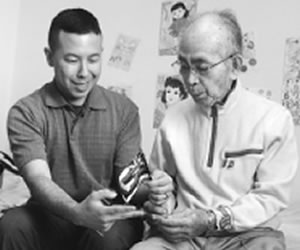Captain Discovers Family History In Japan
By Staff Sgt. Crista Yazzie
E-mail this story | Print this page | Comments (0) | Archive
 Del.icio.us
Del.icio.us
|
USARPAC Public Affairs
CAMP CHITOSE, Japan - One United States Army, Pacific captain crossed boundaries of oceans and generations during Exercise Yama Sakara 57 when he walked into his uncle Masato Okudara’s apartment in Tomokomai, Japan.
While on official orders to the island of Hokkaido, Japan, for Yama Sakura 57, an annual bilateral exercise between the Japan Ground Self-Defense Force and U.S. Army, Hawaii-born Capt. Ryan Mento visited his family that live on the island and learned stories of his veteran heritage.
“It is a dream come true to be here,” Mento said. “It’s hard to believe that through work, I was able to see them. I thought maybe one day the Army might send me to Tokyo, but I never dreamed I’d actually be working right here and able to visit Uncle Masato.”
Okudara, a Japanese Army World War II veteran, shared wartime stories with his nephew, himself a veteran of Operation Iraqi Freedom. The 88-year-old Okudara does not speak any English, and Mento speaks only a few basic Japanese words. Mento’s cousin, Tomoko Taylor, who teaches English in Tokyo, translated for the two.
“I have not seen my cousin since he was very young,” said Taylor, who went on to explain that their family lives in both Hawaii and Japan, but because of the war, Mento’s family in Hawaii was separated from the family in Okinawa and Hokkaido.
“Our Uncle Konsun became an American soldier during the war, and my father (Okudara) was a Japanese soldier, so the war actually broke the family into two,” she said. “They were not able to talk.”
“He (Okudara) thinks the importance of World War II isn’t the winner or loser because in war we both lost many family members, and in that way everyone loses,” said Taylor. “We as a family lost the ability to talk to each other.”
In between discussing personal war stories, Okudara enlightened his nephew with new information about the family’s military heritage and history, telling him about many relatives that served in a military capacity.
“I knew many of my uncles were interpreters for the U.S. military during World War II, but I never knew that (my uncle) actually fought for the U.S. Army in the 442nd Infantry Battalion in the European theater,” said Mento. “Everything he shared, most of it I never knew before.”
Okudara even drew a map of the island of Henza, an island of Okinawa on which the family safely managed to evade capture during the Allied occupation. He showed his nephew on the map which part of the island family members were in on the map, all throughout, sharing anecdotes and memories.
After much discussion, Mento presented Okudara with a Hawaiian flag and the crest of the Signal Regiment, his regimental crest. The Hawaii flag was a memento carried by Mento since he graduated from University of Hawaii’s ROTC program. He described the meaning of the flag and the significance of its travels.
“I have carried this flag everywhere I have been with the Army and now I present it to you,” he said to Okudara.
Okudara graciously excepted and had Taylor place the flag in a place of prominence in his display case.
“I am nearly 90 years old and I don’t know how long I can live after this, so this moment is very precious for me,” said Okudara through translation. “I have so much gratitude for the visit from so far away, and I know I will not live so long, so I want my nephew to have this moment as a memory of his life.”
E-mail this story | Print this page |
Comments (0) | Archive |  | RSS
| RSS
Most Recent Comment(s):








